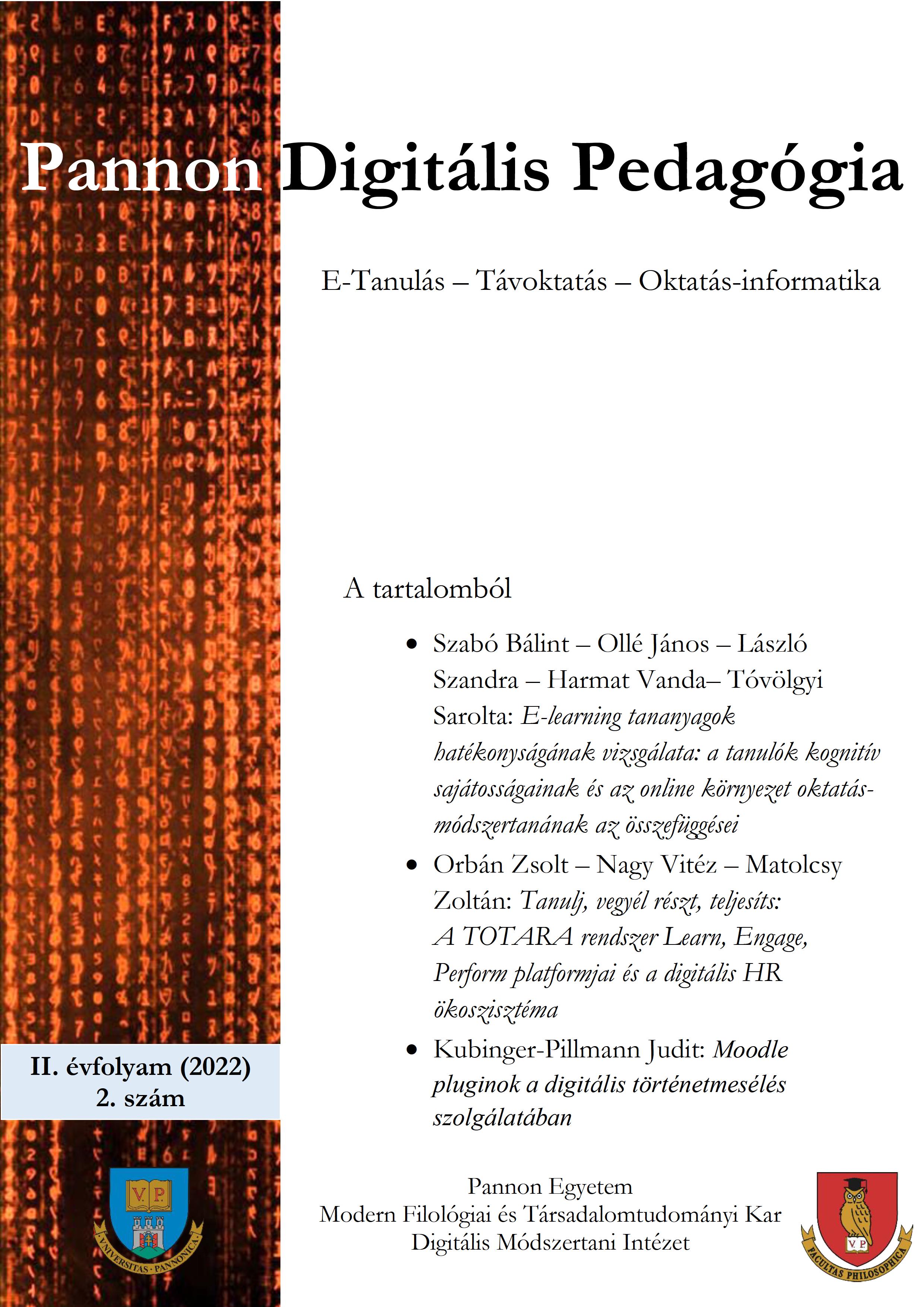Tanulj, vegyél részt, teljesíts: A TOTARA rendszer Learn, Engage, Perform platformjai és a digitális HR ökoszisztéma
DOI:
https://doi.org/10.56665/PADIPE.2022.2.2Keywords:
e-learning, training management system, onboardingAbstract
Totara is a training management system tailored for large organizations, and is based on the e-learning toolkit of the Moodle system. Totara uses Moodle's logic and structure, completed with training organization and knowledge management functions. In addition to e-learning, face-to face trainings can be managed and employees' individual training progress and performance evaluation can also be handled. Since the release of Totara 13, the development team has separated and expanded the previously managed areas: the learning and training organization platform Learn, the performance evaluation functions Perform, and the workplace community platform formerly known as Social, continue to operate under the name Engage, both independently and together as subscription products. When the three solutions are used together, they function as a single, integrated system for the users. The innovation does not just mean a name change, the platforms significantly expand the previous performance evaluation and community functions, so Totara is able to solve the pillars of the HR field with digital solutions in addition to training management. In our study, we present the novelties of the three platforms, how they are built on each other, and share some good practices and lessons learned from corporate implementation projects related to the systems.
References
ABBAS, Z. – UMER, M. – ODEH, M. – MCCLATCHEY, R. – ALI, A. – FAROOQ, A. (2005): A semantic grid-based e-learning framework (SELF). In Cluster Computing and the Grid, 2005. CCGrid 2005. IEEE International Symposium on (Vol. 1, pp. 11-18). IEEE.
APARICIO, M. – BACAO, F. – OLIVEIRA, T. (2016): An e-Learning Theoretical Framework. Educational Technology & Society, 19 (1), 292-307.
BASAK, S. K. – WOTTO M., – BÉLANGER, P. (2018): E-learning, M-learning and D-learning: Conceptual definition and comparative analysis. E-Learning and Digital Media. 2018; 15(4), pp. 191-216.
GOVINDASAMY, T. (2001): Successful implementation of e-Learning: Pedagogical considerations. The Internet and Higher Education, Volume 4, Issues 3–4, pp. 287-299.
GURI-ROSENBLIT, S. – GROS, B. (2011): E-learning: Confusing terminology, research gaps and inherent challenges. International Journal of E-Learning & Distance Education, 25(1).
HENRY, P. (2001): E-learning technology, content and services. Education+ Training, 43(4/5), 249-255.
HERRINGTON, J. – OLIVER, R. (2000): An instructional design framework for authentic learning environments. Educational technology research and development, 48(3), 23-48.
KHAN, B. (2005): Learning features in an open, flexible and distributed environment. AACE Journal, 13(2), 137-153.
LATOUR, B. (2005): Reassembling the Social: An Introduction to Actor-Network-Theory. Oxford, Oxford University Press.
MOORE, J. L. – DICKSON-Deane, C. – GALYEN, K. (2011): e-Learning, online learning, and distance learning environments: Are they the same? The Internet and Higher Education, Volume 14, Issue 2, March 2011, pp. 129-135.
NAGY Vitéz (2016): E-learning ABC. Vezetéstudomány = Budapest Management Review, 47(12), 6-15.
NAGY Vitéz (2020): E-learning értékelési módszerek. Ph.D. értekezés, Budapesti Corvinus Egyetem, Infokommunikációs Tanszék.
ORBÁN Zsolt (2015): E-learning tananyag lehetőségek és a videós módszertan felhasználása. In: Námesztovszki Zsolt – Vinkó Attila (szerk.): XXI. Multimédia az oktatásban és II. IKT az oktatásban konferencia, 2015. május 22-23, pp. 249-254. Újvidéki Egyetem Magyar Tannyelvű Tanítóképző Kar, Szabadka, Szerbia.
ORBÁN Zsolt (2020): Moodle e-learning keretrendszer (LMS). Elérhetőség: https://skoll.hu/moodle-lmselearning-keretrendszer-bevezetes/ Letöltve: 2020.12.20.
ORBÁN Zsolt (2021): E-learning projektek sikertényezői. Az e-learning megoldások actor-network theory elemézse. Ph.D értekezés, Budapesti Corvinus Egyetem, Infokommunikációs Tanszék.
POCSAROVSZKY Károly – ORBÁN Zsolt – FÜLEKI Dániel (2009): Az IKT alapú oktatás lehetőségeinek és realizálható előnyeinek elemzése: Útmutató a tanulói laptop intézményi beszerzéséhez és alkalmazásához. Apertus Közalapítvány, Budapest.
RODRIGUES, H. – ALMEIDA F. – FIGUEIREDO, V. – LOPES, S. L. (2019): Tracking e-learning through published papers: A systematic review. Computers & Education, Volume 136, July 2019, pp. 87-98.
SANGRÀ, A. – VLACHOPOULOS, D. – CABRERA, N. (2012): Building an inclusive definition of elearning: An approach to the conceptual framework. The International Review of Research in Open and Distributed Learning, 13(2), 145-159.
SINGH, V. – THURMAN, A. (2019): How Many Ways Can We Define Online Learning? A Systematic Literature Review of Definitions of Online Learning (1988-2018). American Journal of Distance Education, 33:4, pp. 289-306.
TOTARA (2022): https://www.totaralearning.com, Letöltve: 2022.09.06.
Downloads
Published
Versions
- 2023-01-16 (2)
- 2022-12-24 (1)

